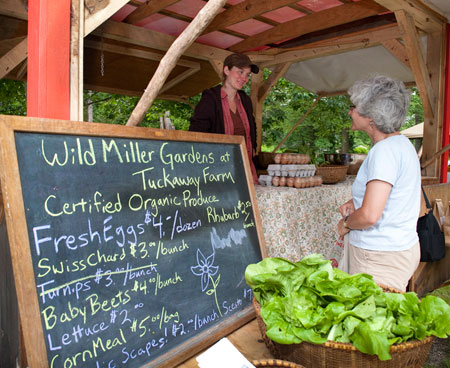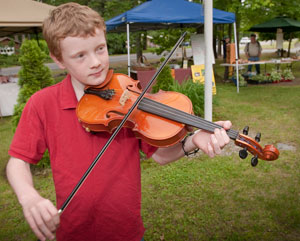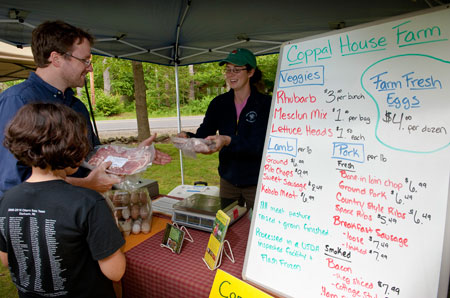
Noel Jost-Coq, of Lee, purchases fresh, organic eggs and vegetables from her friend, Annalisa Miller, co-owner of the local Wild Miller Gardens, at a recent staging of the Lee Farmers' Market.
Cradling a dozen eggs she had just purchased from Wild Miller Gardens, Noel Jost-Coq might not look like a crusader. But her decision to shop at the Lee Farmers Market on her way home last week was a profound statement—about standing up for local agriculture, land conservation, and New Hampshire’s highly touted quality of life.
Well, that, and about buying the tastiest, freshest, and healthiest food around.
Even if it cost a bit more than at the grocery store, when it’s about neighbor helping neighbor, Jost-Coq says that every bunch of locally-grown spinach, pint of strawberries and carton of eggs counts.
“I know the farm, and I know the chickens are healthy and that they take good care of them,” says Jost-Coq, of Lee. “And I also like the idea of supporting local agriculture... I mean, if it wasn’t for markets like this, a lot of these farms might be turned into subdivisions.”
Growers like Annalisa Wild Miller will tell you that their farm and markets like this also depend on a network of experts, other farmers, and customers that connect through the UNH Cooperative Extension.
“The education they provide is so big and so important these days, especially if we want to become more food secure,” says Miller, who operates Wild Miller Gardens at Tuckaway Farm with her husband, Joel Wild Miller. “In a lot of ways, Cooperative Extension is helping people re-learn what it means to grow food locally.”
The Lee Farmers Market is one of about 70 such markets across New Hampshire, with vendors ranging from avid backyard gardeners to large commercial growers. And the UNH Cooperative Extension is responding to the increased interest in markets by offering expert advice on everything from pest control to marketing to food safety and the intricacies of state and federal regulations.

Fiddler Quinn Griffith, 11, of Lee, provides musical ambience at a recent staging of the Lee Farmers' Market.
Twice a week, at farmers markets in Lee and Newmarket, the Millers sell their certified organic produce, raw milk, fresh eggs, maple syrup, and berries to dozens of customers like Jost-Coq. They also sell to regular customers through their Community Supported Agriculture program. Annalisa Wild Miller says Cooperative Extension has been instrumental in providing information to her and her family, which now includes four generations living and working at Tuckaway Farm.
Liz Conrad, of Riverslea Farm in Epping, says UNH Cooperative Extension helped her and her husband—who were new to farming when they purchased their dormant farm more than 20 years ago—transform their property into a sustainable business selling wool, meat, and manure from their herd of some 40 goats and 50 sheep.
“There’s sort of this life cycle with Cooperative Extension where you go from taking in all these resources and the knowledge they offer to new farmers like us, to years later when you’re becoming a resource and sharing your knowledge with other farmers and the community,” Conrad says.
The Conrads now sponsor a 4-H youth group, open their farm to tours by local schools and the public, work with UNH students and faculty and help other farmers either one-on-one or through their volunteer work in Rockingham County.
“Our relationship with Cooperative Extension gave us access to knowledge and to people we never would have found otherwise,” Conrad says. Among her key resources, Conrad counts Nada Haddad, an Extension specialist in agriculture and food.
In addition to developing, designing and implementing educational programs to assist commercial fruit, vegetable, forage and livestock, Haddad has responded to a growing demand for marketing and management skills.
“The people we work with are so good at growing food, but many of them haven’t had any direct sales experience at all,” says Haddad, who’s worked with UNH Cooperative Extension since 1987. “So if we can show them some of the simple things they can do with marketing, that can make a big difference.”

Meghan Boucher, right, a 2009 UNH alumna with a bachelors degree in animal science, and working for the Coppal House Farm in Lee, sells farm-raised cuts of meat to Charles Forcey and his daughter, Liv, of Durham, at a recent staging of the Lee Farmers' Market.
Presentation, for instance, is key to direct sales to the general public, Haddad says. So, does your farm stand have a good-looking sign, and what information does it have? Do you have a picture of your farm, and do you invite customers to come tour it? Is the table you’re using at a good height for customers to reach produce? Are the baskets and bins you use to display the food in good shape, attractive, and the right size? Do you have a website and social media presence? How can you speed up sales if the line at your stand gets long? Thoughtful answers to questions like these add up to better sales, Haddad says.
“Marketing is and remains an important and critical aspect of helping farm businesses to remain sustainable and profitable,” says Haddad, who notes that the major role of Extension is to identify needs and provide educational programs with research-based information.
Back at the Lee market, Meghan Boucher, who graduated from UNH in 2009 with a degree in animal science, says sales are robust for the Coppal House Farm in Lee, where she works on the farm and helps manage the office. The farm’s table display is colorful, clean and alive with fresh produce. A sign also shows they sell their own pork, bacon, and lamb, while a postcard invites visitors to the farm for horse-drawn wagon rides, a corn maze, special events, and indoor farm stand.
“It’s a nice, family-owned farm, and it’s great to come out here and see how the local community really supports us,” Boucher says. “And it’s also great to know Cooperative Extension is helping farms like ours and all across New Hampshire.”
For more about farmers markets, visit the New Hampshire Farmers Market Association and, in the Seacoast region, the Seacoast Growers Association. A listing of New Hampshire farmers markets can be downloaded at: www.nh.gov/agric/publications/documents/farmersmarkets.pdf
-
Written By:
Jim Graham | Communications and Public Affairs | jim.graham@unh.edu | 603-397-9654



















































